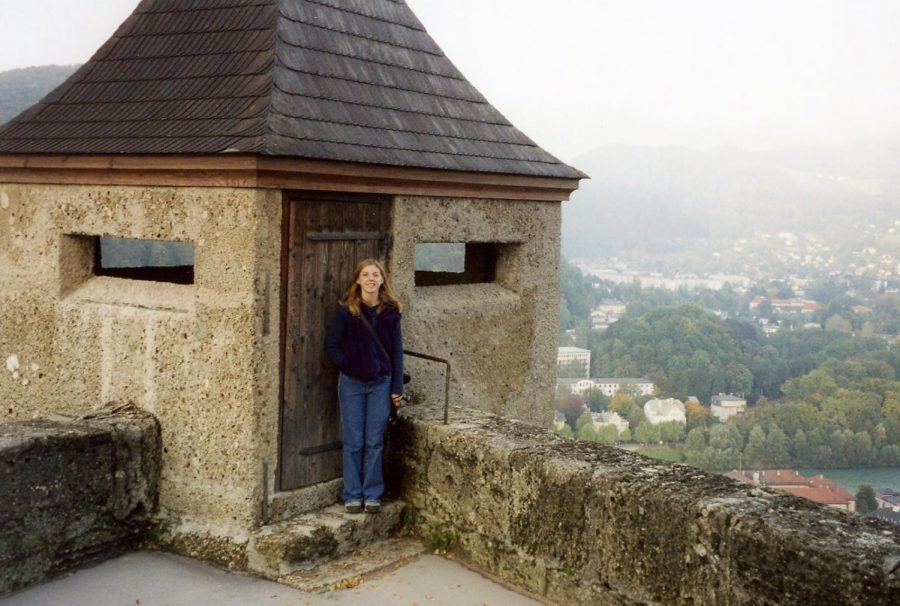A Drastic Turn for UVM’s College of Arts and Sciences: A Series of Perspectives from Professors, Current Students and Alumni Part IV
Larissa Hebert during her semester abroad at the University of Heidelberg, Germany at the Hohensalzburg Fortress in Salzburg, Austria. Photo Credit: Woodrow Thompson
January 28, 2021
Larissa and Phillip Hebert, brother and sister-in-law, both studied German at UVM with Larissa Hebert graduating in 2000 and Phillip Hebert graduating in 2001.
Larissa Hebert’s undergraduate degree in both German and English helped her get a position at Milton Junior/Senior High School teaching exploratory languages to eighth-graders to aid them in choosing a language for high school. With her passion for writing, she decided to get her Vermont educator’s license in English, so she could teach English in high school.
Phillip Hebert is an Academic Program Manager for an MBA program called Building Sustainability at the Technical University Berlin, which trains students in architecture and engineering so they may become employed in the technical or business world. Phillip Hebert advises students as they develop their schedules. Phillip Hebert has a strong connection to language as he grew up speaking German with his mother, who is an Austrian citizen. Phillip Hebert has lived in Germany for the past 18 years, where he manages his family’s apartment complex.
“I don’t think American institutions stress enough how important languages are. I work with international students who come from all over the world with the ability to speak six languages,” Phillip Hebert said.
Larissa Hebert, originally interested in international business, ended up double majoring in German/English. She connected to the German culture through reading German literature and especially by studying abroad. Larissa Hebert mentioned how studying a language also teaches students about cultural differences. According to Larissa Hebert, if students aren’t studying a foreign language, their opportunities for places to study abroad can become more limited.
Larissa Hebert has also met German speakers in Vermont. “I taught piano lessons to some girls and their mother spoke German. She liked that she could speak German to her daughters and pretty much be understood by me,” Larissa Hebert said.
Larissa Hebert received an internship at American Expeditions International, a business in Vermont that formerly organized New England bed and breakfast tours for Europeans. Since most of the customers couldn’t speak English, German helped Larissa Hebert not only to communicate but understand the cultural differences, too.
Aside from small class sizes, the German department was like a family. Both Phillip and Larissa had unique opportunities and relationships as German majors. German Professor Wolfgang (“Papa” as many students fondly call him) Mieder was particularly caring and influential.
For Phillip Hebert, it was an internship at Music Contact International, which turned into a full-time position thanks to connections Professor Mieder had with the company. In Larissa Hebert’s experience, “Papa” Mieder continuously cared for his students. As her advisor, Larissa always looked forward to his animation and excitement when they talked about her upcoming classes.
In 2002, Larissa Hebert received her Master’s degree in Comparative Literature from Dartmouth College, where she wrote her thesis on the fairytale, Sleeping Beauty, in which she compared the French and German editions. Her interest in German fairytales came from having taken Professor Mieder’s course on German fairytales.
As someone who frequently writes letters of recommendation for her students, Larissa Hebert stressed the importance of having a state university that gives students the opportunity to explore their passion, especially for those who don’t know what to study in college.
“It reminds me of when schools start cutting arts programs, and then what happens to those creative students? We aren’t all engineers and business professionals, and I learned that international business was not for me,” Larissa Hebert said. “We are going to lose students to other state universities without these programs. If you’re removing these programs, you’re removing so many ways for students to find what their passion is.”
While there is a constant push for STEM careers, both Phillip and Larissa Hebert emphasized that there are other paths to take beyond math and science.
“Engineering and business are certainly important, but there’s no rule that says an engineer can’t study a language. In the business world, if you speak a foreign language, it will actually benefit you,” Phillip Hebert said. “English is naturally a world language, but there are billions of people who don’t speak it.”
According to Phillip Hebert, institutions of higher learning have the responsibility to promote the liberal arts, even if those programs aren’t necessarily making money. Higher-learning institutions go after what will generate income without promoting a variety of programs. “Who knows what they want to be at 18 years old. I mean, come on,” Phillip Hebert said. “There are a select few who know what they want to be at age seven or eight, but they’re also a minority.”
“If they’re not exposed to it, how are they going to learn anything about it?” Phillip Hebert said.


Anthony Krupp • Jan 28, 2021 at 7:16 pm
Amanda Gorman was wonderful at the inauguration! Understanding artistic language use is so important. Now fund the humanities. Thanks.
Louise May Thompson • Jan 28, 2021 at 2:02 pm
I enjoyed reading all of your articles on the proposed cuts in UVM’s Department of Arts and Sciences. They are well written and informative. Thank you.
Liam Mahabir • Jan 28, 2021 at 7:41 am
Great article Olivia! Smooth and engaging to read. The piece highlights the problem of the UVM cuts very well.